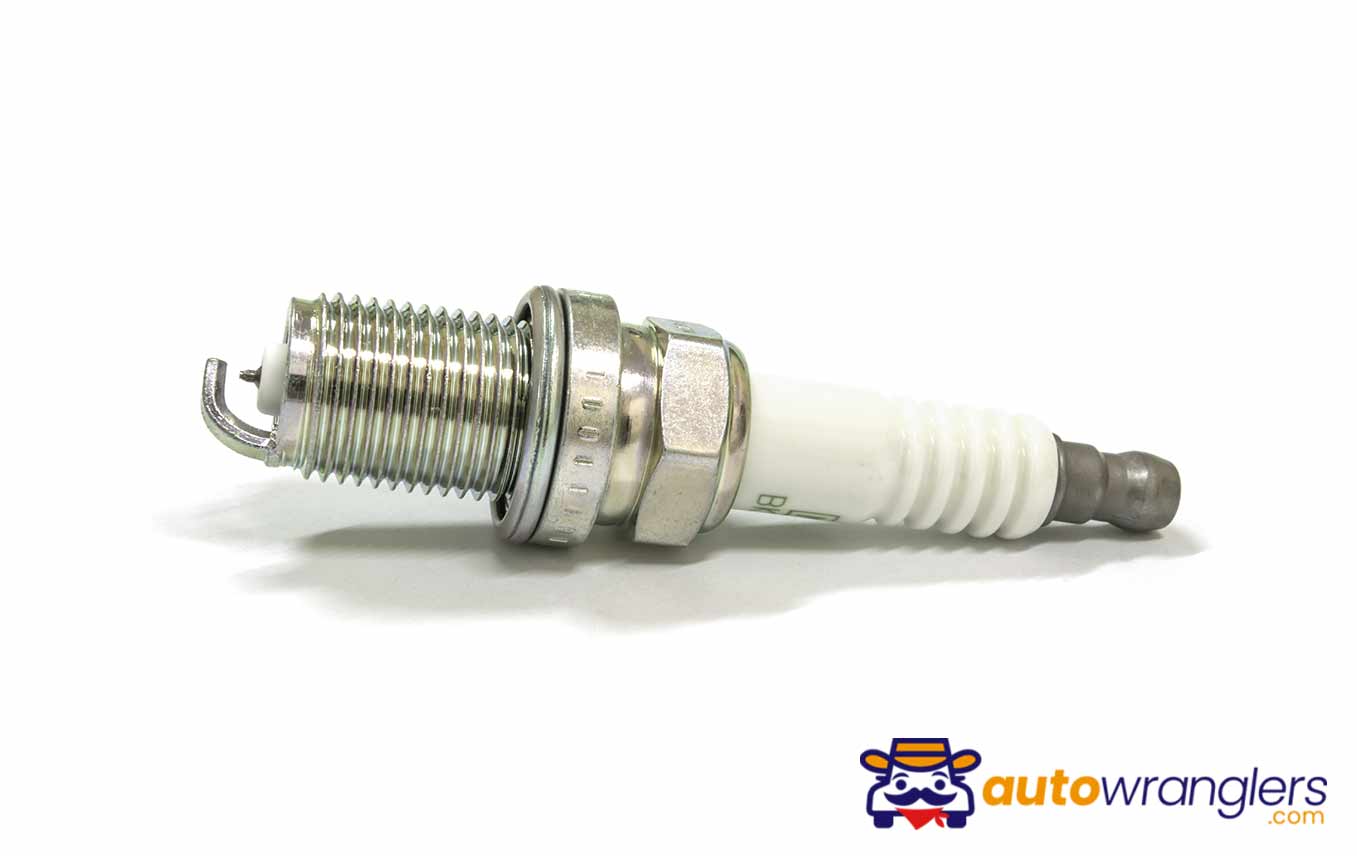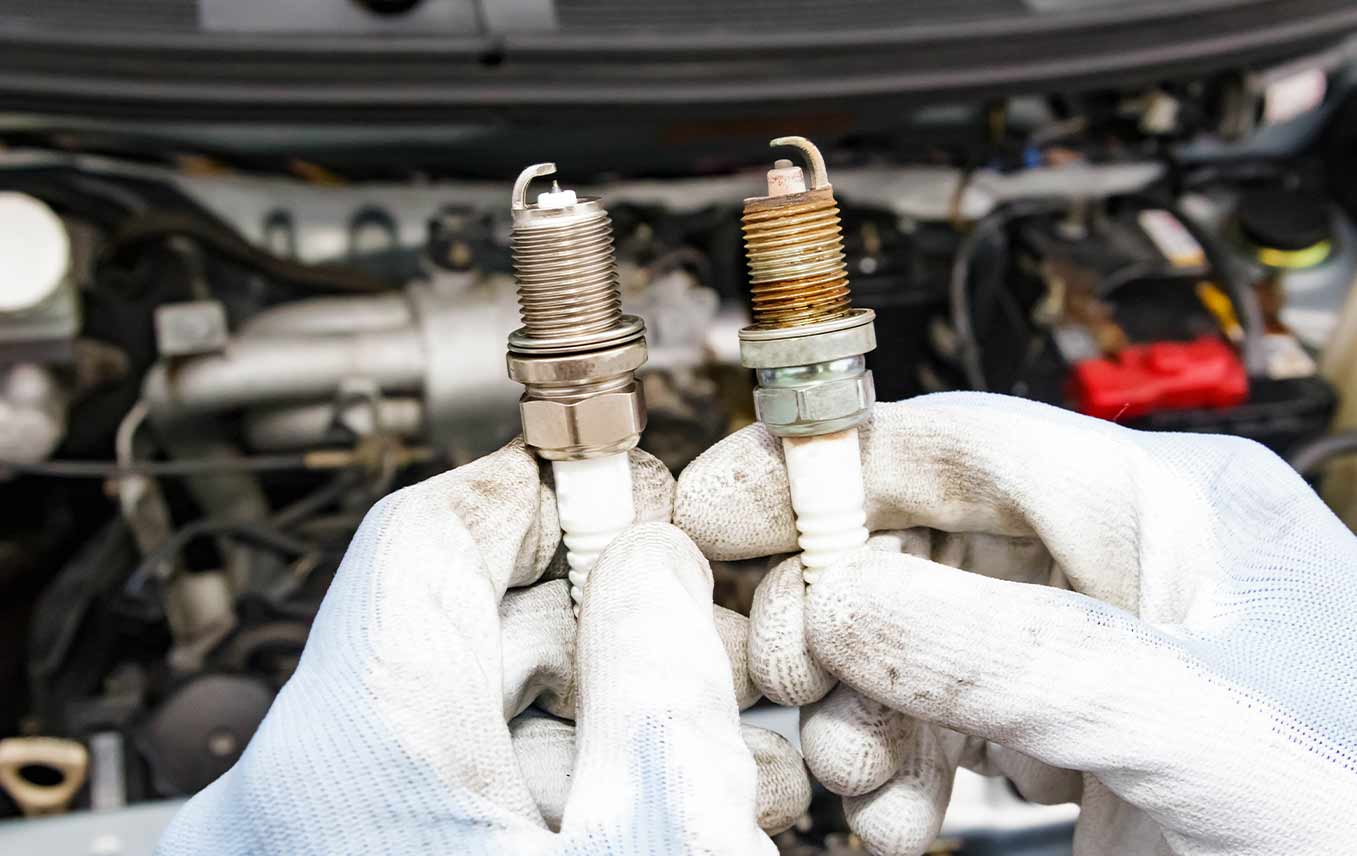Spark plugs may be small, but they are vital to the proper operation of your car’s engine. If your spark plugs start to fail, you may experience hard starts, sluggish performance, and engine misfires. Thankfully, spark plugs are relatively inexpensive and not extremely hard to replace. Understanding how these parts work and the function they perform will allow you to detect the early warning signs of a failure. We will also provide a complete guide for spark plug replacement and give you an understanding of how much you can expect to pay for this auto repair. Keep reading for the details.
What Are Spark Plugs And What Do They Do?

If you are reading this, you might be wondering “What is a spark plug?” or “What do spark plugs do?” We will explain both.
Spark plugs are small devices that screw into your cylinder heads and sit at the top of each cylinder on your engine. Depending on the size of your engine, your car may have anywhere from 3 to 8 spark plugs in it. Some larger performance engines like a 12 cylinder engine might even have 12 spark plugs! As the name implies, the spark plug provides a spark that ignites the fuel mixture inside the combustion chamber of your cylinder. Let’s look in a little more detail.
First – let’s talk about the basics of an internal combustion engine. If you have an electric vehicle, don’t worry because your car does not have spark plugs! Internal combustion engines require three basic things to operate – fuel, air, and spark. Remove any of the three from the equation and your car will not run properly, it might not even run at all!
When your engine runs, the pistons move up and down inside the cylinders. This motion turns the crankshaft, which eventually causes the wheels to turn as the motion is transferred through the transmission. The spark plugs assist in the motion of the pistons.
Air and fuel are mixed inside the top of the cylinder. This mixture is compressed as the piston raises inside the cylinder thus making the volume inside smaller and smaller. Here is where the spark plug comes into play.
The spark plug receives a jolt of electricity from your car’s ignition system and the plug creates a spark inside the cylinder. This spark ignites the fuel mixture and causes the piston to be pushed back down inside the cylinder. When all the cylinders are working together simultaneously, the engine continues running and this motion continues.
Some vehicles use a central ignition system and send the electricity to the spark plugs through a set of wires attached to each plug. Other vehicles have a single ignition coil on each spark plug. This tends to be more efficient and helps to prevent the entire system from failing at once since each coil is isolated from each other.
When a spark plug malfunctions, you can now see why that affects your car’s engine. If a bad spark plug simply does not produce a spark properly a couple of times, then you may only notice a slight hiccup in your running engine. However, if the plug completely stops producing a spark, then there will be a noticeable problem with the engine as one whole cylinder will stop producing power. If multiple plugs fail, then your car might make a clicking noise and not even start.
Spark plugs also need a proper amount of gap to work correctly. The term gap refers to the distance between the middle and side electrodes. If the gap is not set properly, then the spark will not arc correctly between the two pieces of metal.
There are also different types of material that are used to produce spark plugs. A standard spark plug uses copper for the center diode or electrode. You can also find spark plugs that use iridium or platinum diodes. These produce a more consistent spark and tend to last longer than the copper plugs. On the other hand, they are also more expensive than copper as well.
When Should You Replace Spark Plugs?
Most people have no clue when to change spark plugs. Luckily, spark plugs last for a long period of time. These parts are not going to need to be replaced every month or two. However, plugs do have a maintenance schedule and will need to be replaced on a regular basis. Most vehicles require spark plug replacement every 30,000 – 40,000 miles.
You should refer to your owner’s manual for your manufacturer’s recommendation on replacement intervals. You can also contact your local dealership to ask about the appropriate interval for your car. In some cases, your plugs may need to be replaced before the specified interval.
You can always remove a plug and examine it to determine whether it should be replaced. If the electrode appears black or burned, then you should definitely replace the plugs. If you experience any skips or misfiring from your engine, then the plugs could be the culprit. A reduction in fuel economy might also signal that the plugs need to be replaced. Lastly, a check engine light is often illuminated after a misfire, so seeing that light on your dash could mean that you need new spark plugs.
When your spark plugs do not fire properly, you may be passing more unburned fuel through your exhaust system. This can lead to premature failure of your catalytic converter – a very expensive repair! If this has happened, then you might want to go ahead and contact Auto Wranglers. We buy cars all over the country and will pay cash for yours so that you don’t have to worry about that expensive bill.
Any reputable car repair shop should be able to easily examine one of your old spark plugs and determine whether they need to be replaced. If you have driven 40,000 miles or more without replacing your plugs, then you can bet that they likely need to be replaced.
How Much Does Spark Plug Replacement Cost?
We’ve got good news! In most cases, replacing your spark plugs is not going to break the bank! Especially compared to other vehicle repairs, getting new plugs in your vehicle is relatively inexpensive. Obviously, the more spark plugs your car needs, the higher the cost will be.
Spark plugs cost anywhere from $4 – $15 apiece. So, you could technically replace the plugs in your vehicle for about $20 if you only need a few and you could do the work yourself. The engine in some vehicles is placed so that the plugs are easily accessible and not a ton of labor is required. However, some high-end vehicles like BMW and others are more difficult and require more expensive plugs and more labor. You might expect to pay $500 or more including labor costs to have an automotive repair shop replace the plugs in this kind of vehicle.
If that is more than you can afford, then consider simply selling your car to Auto Wranglers. We will make you an instant cash offer to buy your car and you will not have to worry about paying for new plugs. You can use that money to buy a car that does not need any maintenance right away!
How To Change Spark Plugs
We know that many of you reading these articles are DIY experts, so you are always looking for a way to perform your own work. Changing spark plugs is usually not an extremely difficult job, so you should be able to tackle it with just a few basic tools.
First, you will need a spark plug socket that fits your plugs. Make sure you have a good light handy as well because it can get dark in the back of your engine bay. Look around the intake manifold and locate all the plugs inside your cylinder heads. Begin removing them one at a time by removing the spark plug wire and then unscrewing the plug. As you remove each plug, go ahead and replace it with a new plug. Make sure that you reattach the same wire that was used on the old plug!
When putting in the new plugs, be sure you do not over-tighten them! This can lead to major damage to your engine. You should get the proper torque specs from your service manual. Also, a little bit of dielectric grease inside the coil boot will help ensure a good connection with the plug. A small amount of anti-seize lubricant on the threads of the plug can help ensure that you are able to remove the plug easily the next time you change them.
Since you are already replacing the plugs, this might be a great time to perform a full tune-up on your vehicle. You might want to go ahead and replace the air filter and fuel filter as well as complete an oil change while you’re at it. A good tune-up can help improve your gas mileage and engine performance, lower your emissions, and keep your car on the road for years to come!
Conclusion
Spark plugs are a crucial part of your car’s engine. While not covered by warranty under normal circumstances, they must be replaced at regular intervals to keep your car running smoothly. Thankfully, this is a fairly cheap and easy repair for most vehicles like Toyota, Chevrolet, and others. If you have a high-end vehicle, then you might be looking at several hundred dollars for new plugs. Many people don’t have that kind of cash for a repair, so consider selling your car. Even if it’s total junk, you can sell that junk car for $500 or more to Auto Wranglers.


